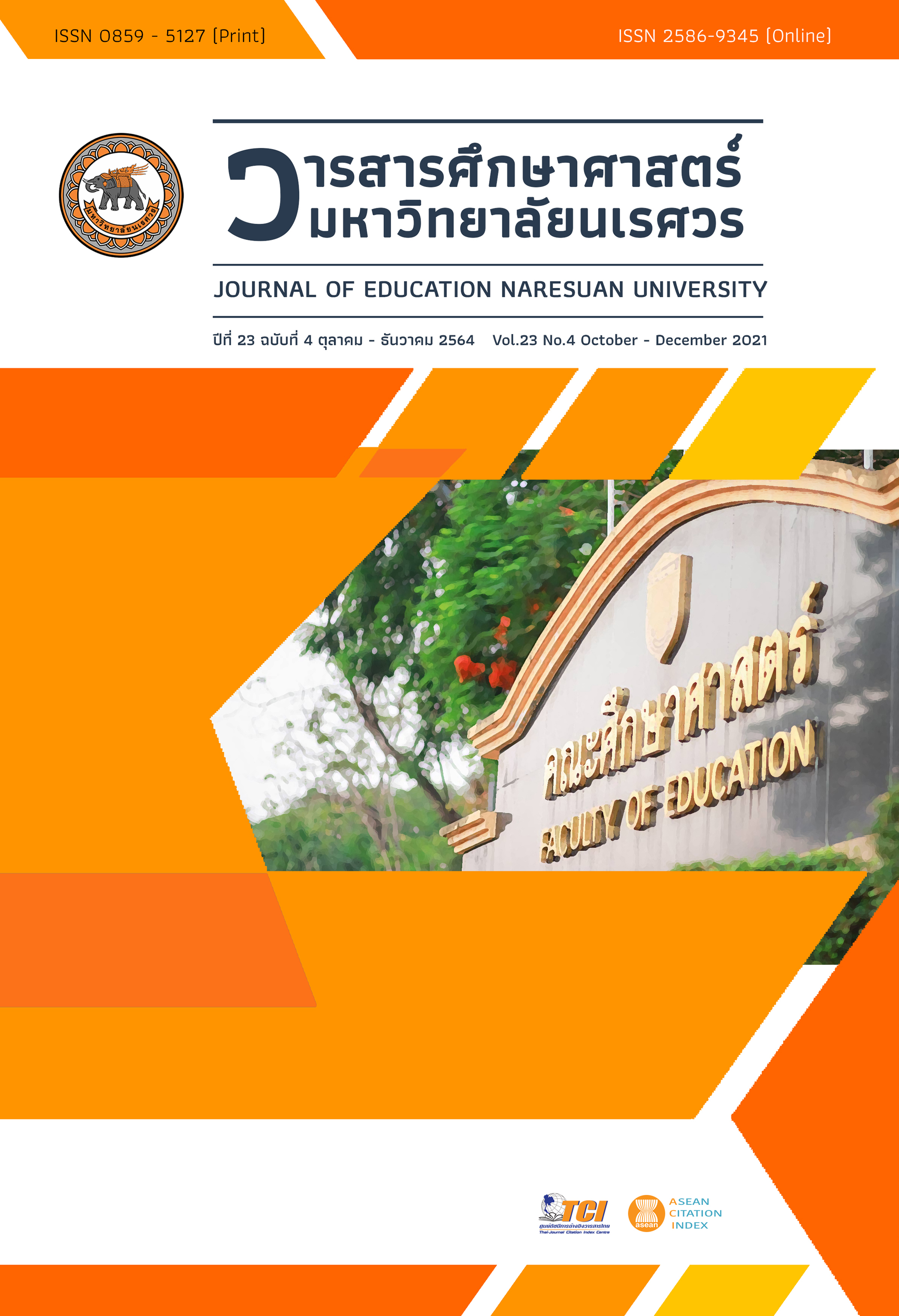THE SCHOOL BASED PROFESSIONAL DEVELOPMENT FOR ENHANCING COOPERATING SCIENCE TEACHERS’ TECHNOLOGY KNOWLEDGE การพัฒนาวิชาชีพครูโดยใช้โรงเรียนเป็นฐานส่งเสริมความรู้ด้านเทคโนโลยีของครูพี่เลี้ยงวิทยาศาสตร์
Main Article Content
Abstract
Current reforms in Science education in Thailand call for integration between science and other disciplines. The biggest change happening is the new Learning Indicators and National Science Core Curriculum B.E. 2551 (the Revised National Science Curriculum B.E. 2560) which technology is built as the 4th Learning Core of Science Learning and Teaching Framework. Such integrated teaching and learning at the K-12 level offers students an opportunity to experience learning in real-world, multidisciplinary contexts and to be well -being citizen. The purpose of this mixed methods study is to develop 24 cooperating science teachers’ Technological Knowledge (TK) for their first-time experiences in implementing integrated technology curricular units in elementary and middle school science classrooms. Professional learning experiences was conducted during 1-year internship course. Both cooperating science teacher and student teacher were working together through coaching system. This study draws upon both lesson study, classroom implementation data, teacher reflective interviews, and PLC meeting reports to illustrate different degrees of integrated technology instruction and to understand teachers’ challenges and successes with these varying approaches. Mixed methods were used at the research framework. Quantitative and qualitative data were used to present the research result. Findings indicate that when the teachers’ TK was in progress, the teachers could blend appropriate technologies, science content and their teaching methods. They understand clear indication of the new curriculum and can bring the curriculum into their lesson plans and practices. The work presented here informs educational researchers, policy makers, and K-12 educators that there are several challenges when it comes to implementing new Science curriculum initiatives in K-12 education. Although this work is limited to elementary and middle school science teachers’ experiences with first-time technology integrated instruction; therefore, this work may shed light on general struggles that are common to science teachers who are integrating across content disciplines for the first time. Therefore, providing the teachers with effective Coaching System and Professional Development Programs are needed to build active teachers.
Article Details
The owner of the article does not copy or violate any of its copyright. If any copyright infringement occurs or prosecution, in any case, the Editorial Board is not involved in all the rights to the owner of the article to be performed.
References
Alayyar, G. M., Fisser, P., & Voogt, J. (2012). Developing technological pedagogical content knowledge in pre-service science teachers: Support from blended learning. Australasian Journal of Educational Technology, 28(8), 1298-1316.
Chatmaneerungcharoen, S. (2016). In-service science teachers’ technological pedagogical content knowledge integrating local context and sufficiency economy into science teaching. Phuket Rajabhat University Academic Journal, 12(2), 107-139.
Chatmaneerungcharoen, S. (2019). Technological pedagogical content knowledge for STEM Education in Thailand. Kasetsart Educational Review, 34(1), 51-64. [in Thai]
Daehler, K. R., & Shinohara, M. (2001). A complete circuit is a complete circle: Exploring the potential of case materials and methods to develop teachers’ content knowledge and pedagogical content knowledge of science. Research in Science Education, 31, 267-288.
Koehler, M. J., Mishra, P., & Cain, W. (2013). What is technological pedagogical content knowledge. Journal of Education, 193(3), 13-19. DOI:10.1177/002205741319300303
Koehler, M., Mishra, P., Kereluik, K., Seob, S., & Graham, C. (2014). The Technological Pedagogical Content Knowledge Framework. Handbook of Research on Educational Communications and Technology. 101-111. 10.1007/978-1-4614-3185-5_9.
Office of the Basic Education Commission. (2017). Learning Indicators and National Science Core Curriculum B.E. 2551 (the Revised National Science Curriculum B.E. 2560). Bangkok: The Agricultural Cooperative Federation of Thailand. [in Thai]
Osborne, J., & Hennessy, S. (2003). Literature review in science education and the role of ICT: Promise, problems and future directions. Futurelab Series, Report 6.
Tanak, A. (2018). Designing TPACK-based course for preparing student teachers to teach science with technological pedagogical content knowledge. Kasetsart Journal of Social Sciences, 41(1), 53-59. https://doi.org/10.1016/j.kjss.2018.07.012
Tobin, K., & McRobbie, C. J. (1996). Cultural myths as constraints to the enacted science curriculum. Science Education, 80, 223 - 241.
van Driel, J. H., de Jong, O., & Verloop, N. (2002). The development of pre-service chemistry teachers’ pedagogical content knowledge. Science Education, 86, 572-590.
van Driel, J. H., Verloop, N., & de Vos, W. (1998). Developing science teachers’ pedagogical content knowledge. Journal of Research in Science Teaching, 35(6), 673-695.
Yerrick, R., Parke, H., & Nugent, J. (1997). Struggling to promote deeply rooted change: The “filtering effect” of teachers' beliefs on understanding transformational views of teaching science. Science Education, 81(2), 137-159.


